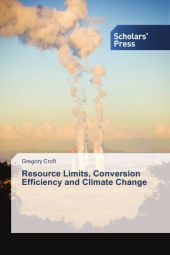 Neuerscheinungen 2013Stand: 2020-01-07 |
Schnellsuche
ISBN/Stichwort/Autor
|
Herderstraße 10
10625 Berlin
Tel.: 030 315 714 16
Fax 030 315 714 14
info@buchspektrum.de |

Gregory Croft
Resource Limits, Conversion Efficiency and Climate Change
2013. 220 S. 220 mm
Verlag/Jahr: SCHOLAR´S PRESS 2013
ISBN: 3-639-51612-5 (3639516125)
Neue ISBN: 978-3-639-51612-8 (9783639516128)
Preis und Lieferzeit: Bitte klicken
There are two commonly-used approaches to modeling the future supply of mineral resources. One is to estimate reserves and compare the result to extraction rates, and the other is to project from historical time series of extraction rates. Perceptions of abundant oil supplies in the Middle East and abundant coal supplies in the United States are based on the former approach. In both of these cases, an approach based on historical production series results in a much smaller resource estimate than aggregate reserve numbers. Because the U.S. holds very large coal reserves, synthesizing liquid hydrocarbons from coal has been suggested as an alternative fuel supply. This conclusion is not supported by published coal production data, which show that U.S. anthracite and bituminous coal are already past their production peak. This result contradicts estimates based on aggregated reserve numbers. Because increasing coal consumption is the leading source of growth in carbon emissions, this result has major implications for climate change models, most of which assume steadily increasing emissions.
Greg Croft is an independent petroleum consultant and a lecturer in Environmental and Earth Science at Saint Mary s College in Moraga, California. He holds a PhD in Civil and Environmental Engineering from UC Berkeley, an MS in geophysics from Stanford and a BA in geology from UC Santa Barbara.


